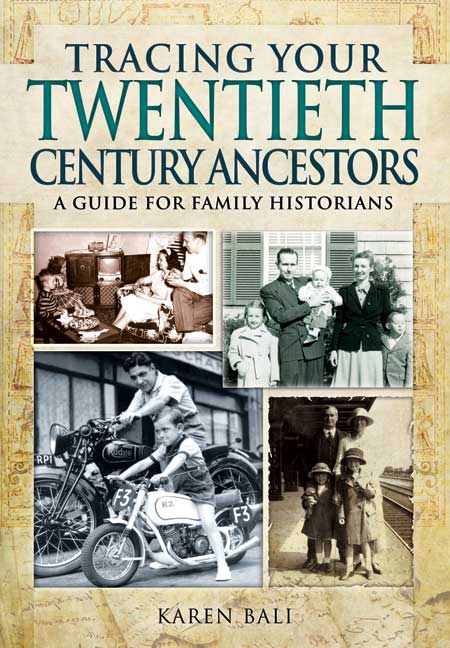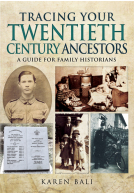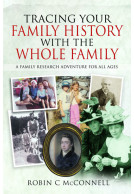Tracing Your Twentieth-Century Ancestors (ePub)
A Guide for Family Historians
Imprint: Pen & Sword Family History
File Size: 8.9 MB (.epub)
Pages: 156
Illustrations: 40
ISBN: 9781473885066
Published: 12th October 2016
| Other formats available | Price |
|---|---|
| Tracing Your Twentieth-Century… Paperback Add to Basket | £14.99 |
The recent past is so often neglected when people research their family history, yet it can be one of the most rewarding periods to explore, and so much fascinating evidence is available. The rush of events over the last century and the rapid changes that have taken place in every aspect of life have been dramatic, and the lives of family members of only a generation or two ago may already appear remote. That is why Karen Bali’s informative and accessible guide to investigating your immediate ancestors is essential reading, and a handy reference for anyone who is trying to trace them or discover the background to their lives.
In a sequence of concise, fact-filled chapters she looks back over the key events of the twentieth century and identifies the sources that can give researchers an insight into the personal stories of individuals who lived through it. She explains census and civil records, particularly those of the early twentieth century, and advises readers on the best way to get relevant information from directories and registers as well as wills and other personal documents.
Chapters also cover newspapers – which often provide personal details and offer a vivid impression of the world of the time – professional and property records and records of migration and naturalization. This practical handbook is rounded off with sections on tracing living relatives and likely future developments in the field.
As featured
WDYTYA - May 2024
A thoroughly practical and informative source which offers useful guidance to beginner and experienced researchers alike. A full bibliography gives access to more specialised sources. It is tempered with sound advice and common sense, especially in the chapter on contacting living relatives.
Reference Reviews
This is a useful book, particularly to beginners in family history, as it deals with finding recent ancestors.
Rotherham FHS
The introduction mentions data protection - a useful topic when researching more modern records. The first chapter is a brief overview of UK life in the 20th century, covering education, economics, travel, poverty, housing, home life and welfare reforms. The author mentions the Conservatives making council houses available to buy but when she talks about the creation of council housing and the NHS and nationalisation of industry she makes no mention of the Labour Party - maybe a little political bias here. The rest of the book is set out with clearly defined topics such as civil and parish records, indicating how to search online indexes and order certificates. The census is explained with reference to the 1901 and 1911 censuses and 1939 register.
Other topics covered are wills and how to find them, war records, adoption, occupational records, property records, migration, newspapers (print and online sources), phone directories, electoral registers, women’s rights and equality, and there is a chapter on tracing living relatives using social media and directories, with advice about protocol in contacting possible relations. Useful websites are referred to throughout the book. It ends with advice about how to preserve records and research for future generations.
Although it is a recent book (2016), there is even more scope for researchers since it was published, for example with the recent changes to the GRO indexes now giving mother’s maiden name for births and age at death right back to 1837.
The author provides adoption research services and tracing services for the legal profession.
Meet the author and review.
Your Family History, March 2017
We tend to think of family history often reaching a sticking point in the period before the Victorians began their great data-recording projects form the 1830s onwards. However, the post-Victorian era can also pose many challenges, especially when many of the records (such as the 1921 census) are still unavailable for privacy reasons. Although our immediate relatives may have tales to tell of the most recent couple of generations, they can also be wildly inaccurate!
Enter Karen Bali, who has made it her business to become an expert on 20th century research and tracing living relatives in particular. This book distils her wealth of experience on the subject, beginning with a breezy survey of 20th century social history and then exploring the records and resources available by themes such as occupations, property and migration. There are also specific chapters on the bigger record types such as the census, civil registration and newspapers.
Read it for: A useful round-up of 20th century research advice
Perfect for those exploring the lives of more recent relations. Genealogy expert Karen Bali, who specialises in researching adopted and living relatives, identifies and explains the key records and online sources to aid you on your journey, including the census and directories, civil service and employment records, wills, electoral registers and a brief introduction to the 1939 Register. Packed with case studies and practical advice, this is an easily accessible read with lots of leads and sensible tips of tracing more recent family, including how to approach long-lost living relatives and what the digital future may hold for family historians.
Family Tree, February 2017
For anyone looking to find their UK relatives in the recent past, this is great start. If you are a beginner this is a perfect book, or if you have a little experience in genealogy, but are an American like myself, there are some helpful insights here. Some of the information I knew already, like some of the websites to look for census or newspaper records. However, if your looking in Britain some things are either called by a different name or there are differences in what is available. For instance, I kept going past conscription, not realising it was just their version of the draft. In some instances its worth knowing where not to look. I kept coming up short on census records. However, after reading this, I found out that they use different year increments and there just will not be any census records for the next one hundred years. Very Helpful!
Goodreads, Michelle McMenamin
When we were compiling our own family tree a couple of years ago, we concentrated first on those ancestors who we knew intimately and then their forebears, eventually working our way back through previous centuries. We think of ourselves of twentieth century people, lucky enough to have survived through to the next, the twenty-first. The problem with twentieth century genealogy is the sad fact that the latest census available for research is the 1911 one. I think this is a national scandal, personally. Karen Bali suggests other, brilliant and unusual ways of getting at the information you want, but it remains a national disgrace that with modern scanning techniques, more of the data that belongs to us is not available. A great book, most welcome.
Books Monthly, November 2016 – reviewed by Paul Norman
The history behind a family's migration from Kenya, and the decline in opportunities for work in domestic service. A teacher's thoughts on hearing that the fathers of half her pupils has gone down with the Titanic. These are among the subjects unearthed by this excellent new book from Pen and Sword.
WDYTYA? Magazine November 2016 - reviewed by Pam Ross
Karen Bali has devoted much of her working life to helping people find living relatives. She has vast experience of researching family history in modern times and this shows in her new guide to research in the 20th century.
The book starts with a potted history of the century, setting our own and our ancestors' lives into context - anyway remember when the choice of computer was Acorn, Amstrad or Sinclair? Or when the neighbours came into admire a new-fangled washing machine? When a divorce in the family was widely considered a disgrace?
The rest of the book discusses in detail the main sources available and where you might find them. She also touches on some less familiar
areas - for example the chapter on conflict and defence includes useful sections on air raid wardens and the Women's Land Army. Not everything available is online, but a considerable amount is. For the records that aren't made available for reasons of privacy, there's discussion of how to make an application, and the likelihood of success.
There's a helpful section on how to approach living relatives (a letter gives the best chance of success while an excited phone call might cause a panic about identity theft), plus a discussion on the difference between requests covered by the Data Protection and Freedom of Information Acts.
The book is written in an easy style with helpful illustrations, a workable index and plenty of openings for further research, all interspersed with illustrated case histories from the author's own experience. The main focus is on research in England and Wales, but research possibilities in Scotland and Ireland are frequently mentioned. It's also a book you'll find useful if you're searching from overseas.
The book is widely researched and has been assembled on the basis of long experience in using the documents concerned.
If you're having trouble with your most recent ancestors Karen Bali may have come up with a solution for you - it's certainly well worth a look.
About Karen Bali
Karen Bali is an expert genealogist who specializes in family history research of the recent past. She provides adoption research and tracing services for the legal profession through her research service (www.people-search.co.uk). Karen also runs online courses and evening classes in genealogy. Her books include The People Finder: A Self-help Handbook for Finding Relatives, New Cousins: How to Trace Living Descendants of Your Ancestors and Researching Adoption: An Essential Guide to Tracing Birth Relatives and Ancestors.
















